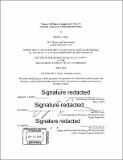"Stop or i'll shoot, comply and I won't" : coercive assurance in international politics/
Author(s)
Pauly, Reid B. C.
Download1136158681-MIT.pdf (34.98Mb)
Alternative title
Coercive assurance in international politics
Other Contributors
Massachusetts Institute of Technology. Department of Political Science.
Advisor
Barry R. Posen.
Terms of use
Metadata
Show full item recordAbstract
Why do some coercive threats succeed while others fail? Successful coercion requires not only that I credibly threaten you until you comply, but also that I credibly assure you that I will not punish you after you comply. This is the overlooked dilemma at the heart of coercive strategies. I develop and test Coercive Assurance Theory to show that coercion is more likely to succeed when credible threats are paired with credible assurance. Threats often fail because they are insufficiently contingent. I then step back to test theories on how states make their assurances believable in the process of coercive bargaining. Existing literature on commitment-making in international politics implies a tradeoff between threat and assurance credibility. Instead, I propose that threats and assurances sometimes require different conditions and that fluctuations in their credibility do not always correlate. In particular, states can generate credible assurance through three strategies: disentangling demands, exerting coercive control, and reducing visibility. Coercers often make multiple demands of targets but fail to keep punishments and demands discretely linked. Coercers also navigate their own domestic and international coalitions, which contain actors with varying interests. Unified coercers mitigate fears of capricious punishment. Finally, visibility reduction-for example, by allowing targets to plausibly deny their concessions-diminishes target fears of paying reputational costs. All three mechanisms also signal that the coercer is not seeking a pretext for punishment. I test my theory by examining cases of coercive bargaining between non-allies over nuclear weapons programs, with chapters on South Africa, Libya, and Iran. A policy evaluative chapter also applies the theory to North Korea. I explain not only the occurrence but also the timing of nonproliferation bargains using primary documents from U.S. government archives, the South African apartheid-era government archives, and the International Atomic Energy Agency (IAEA) archives. I supplement these documents with the memoirs, recollections, and writings of target state policymakers, military leaders, and nuclear scientists. I also conducted interviews with participants in relevant policy-making processes. By introducing a theory of assurance and highlighting its role in striking coercive bargains, the dissertation aims to improve policymaking in a critical realm.
Description
Thesis: Ph. D., Massachusetts Institute of Technology, Department of Political Science, 2019 Cataloged from PDF version of thesis. Includes bibliographical references (pages 420-478).
Date issued
2019Department
Massachusetts Institute of Technology. Department of Political SciencePublisher
Massachusetts Institute of Technology
Keywords
Political Science.